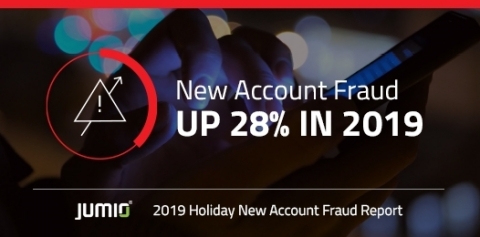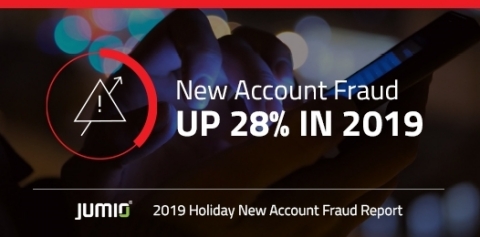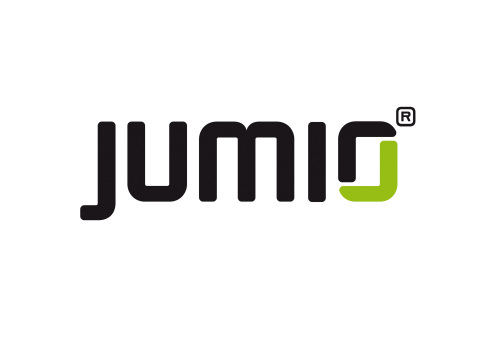PALO ALTO, Calif.--(BUSINESS WIRE)--New data from Jumio, the leading AI-powered trusted identity as a service provider, reveals that new account fraud increased 27.8% worldwide YTD in 2019, compared to full-year 2018 results, and more than 100% compared to 2014 levels. Surprisingly, attempted new account fraud was 19% less during the Black Friday/Cyber Monday weekend (compared to the average 2019 fraud levels), when fraud attempts normally escalate.
In the third edition of Jumio’s Holiday New Account Fraud Report, fraud is defined as an attempt by an individual to create a new online account by manipulating a government-issued ID. The company compared global ID fraud patterns from millions of ID verification transactions between 2014 and 2019 across various industries, focusing on the period between Black Friday and Cyber Monday, including Thanksgiving and the Tuesday after Cyber Monday. Jumio also analyzed new account fraud levels across regions, countries, industries and time period.
Often, the first step in identity theft starts by creating a new account online. Identity theft is the deliberate use of someone else’s identity (e.g., name, address, Social Security number, bank accounts) to get money and credit and make holiday purchases. But, identity theft is also being used to perpetrate online fraud, steal property, falsify educational and other credentials, access healthcare and launder money.
“As cybercriminals perfect and fine-tune their impersonation efforts, it’s getting more difficult for modern enterprises to distinguish between high-risk from low-risk users — and this is only going to accelerate thanks to large-scale data breaches, the evolution of the dark web and the looming threat of identity theft,” said Philipp Pointner, Jumio’s chief product officer. “All too often, companies rely on traditional methods of identity verification which are not well equipped to detect sophisticated methods of new account fraud.”
Jumio is the global leader in online identity verification, processing nearly 300,000 verifications per day and more than 200 million identities issued by over 200 countries and territories from real-time web and mobile transactions to-date. The 2019 Holiday New Account Fraud Report draws on this experience to determine if the spike in seasonal fraud, normally associated with retail and e-commerce, is also evident in non-retail sectors.
Additional findings:
- New account fraud increased to 1.8% in 2019, a 106.8% increase over 2014 levels. During this year’s holiday period, new account fraud dipped to 1.5% which was still more than 80% higher than 2014 holiday levels.
- The Asia-Pacific region experienced the highest rates of full-year fraud at 3.27% while the U.S. had the lowest rates of fraud at 0.88% — a trend which has been pretty consistent over the last six years. While the U.S. experienced lower holiday fraud rates in 2019, new account fraud was still 138% higher in 2019 compared to 2014 levels.
- Fraud levels in emerging markets, while varied, were significantly higher than developed markets.
- The cryptocurrency and online gaming/gambling industries experienced higher-than-average fraud levels while the sharing economy and travel and entertainment industries experienced minimal fraud levels (i.e., less than 0.6%).
Download the Jumio 2019 Holiday New Account Fraud Report here for additional learnings and insights.
About Jumio
When identity matters, trust Jumio. Jumio’s mission is to make the internet a safer place by protecting the ecosystems of businesses through cutting-edge online identity verification and authentication services that quickly and accurately connect a person’s online and real-world identities. Jumio’s end-to-end identity verification solutions fight fraud, maintain compliance and onboard good customers faster.
Leveraging advanced technology including augmented intelligence, AI, biometrics, machine learning, certified 3D liveness detection and human review, Jumio helps organizations meet regulatory compliance including KYC, AML and GDPR and definitively establish the digital identity of their customers. Jumio has verified more than 200 million identities issued by over 200 countries and territories from real-time web and mobile transactions. Jumio’s solutions are used by leading companies in the financial services, sharing economy, digital currency, retail, travel and online gaming sectors. Based in Palo Alto, Jumio operates globally with offices in North America, Latin America, Europe and Asia Pacific and has been the recipient of numerous awards for innovation. For more information, please visit www.jumio.com.




